Lea Wait's Blog, page 29
October 4, 2024
Weekend Update: October 5-6, 2024
 Next week at Maine Crime Writers there will be posts by John Clark (Monday), Jule Selbo (Tuesday), Joe Souza (Thursday), and Vaughn Hardacker (Friday).
Next week at Maine Crime Writers there will be posts by John Clark (Monday), Jule Selbo (Tuesday), Joe Souza (Thursday), and Vaughn Hardacker (Friday).
In the news department, here’s what’s happening with some of us who blog regularly at Maine Crime Writers:
From Kathy Lynn Emerson: Face Down Across the Western Sea, book seven my the Face Down series featuring sixteenth-century gentlewoman, herbalist, and sleuth, Susanna, Lady Appleton, is back in print as of October 3 in a newly-edited trade paperback edition. That means the first seven novels are now available at $15.99 each and can be ordered by any bookseller or library, although (since they are Print on Demand) they will not ordinarily be found on the shelves in bookstores. Here’s the blurb for this one:
When Queen Elizabeth wants to prove England has an ancient claim to the New World on the far side of what was then known as “the Western Sea,” she orders a group of scholars to find evidence of early settlements. Susanna is drawn into intrigue and danger through her friendship with Sir Walter Pendennis, who is hosting the summit at his Cornwall manor house. When one of the learned gentlemen is murdered, everyone is a suspect.
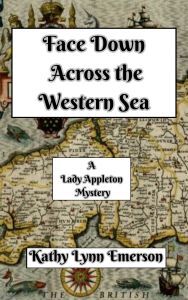
The remaining three mysteries in the series and a collection of all sixteen short stories featuring characters from it (Lady Appleton’s World) will be released between now and February of 2025.
Coming on October 23rd, my new stand alone thriller from Encircle Publications:

Still on the fence about attending the New England Crime Bake (crime bake.org)? The crime writing community is a vibrant and supportive one. It’s a great place to talk writing and make connections. Here’s what Kate Flora will be doing there:
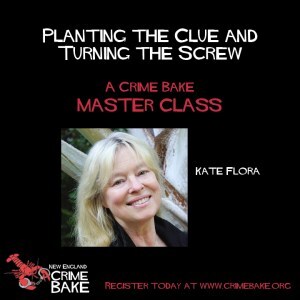
An invitation to readers of this blog: Do you have news relating to Maine, Crime, or Writing? We’d love to hear from you. Just comment below to share.
And a reminder: If your library, school, or organization is looking for a speaker, we are often available to talk about the writing process, research, where we get our ideas, and other mysteries of the business, along with the very popular “Making a Mystery” with audience participation, and “Casting Call: How We Staff Our Mysteries.” We also do programs on Zoom. Contact Kate Flora
October 3, 2024
Here Comes Autumn, and Crime Bake
Brenda here, a bit freaked out that it’s October 4. How did we get here so fast?
No two ways about it, the big seasonal shift is upon us. Apples are being picked, fall festivals are in full swing and pumpkins are everywhere you look. That fleece jacket’s felt pretty darned nice on some recent chilly mornings, hasn’t it?

The glory of October
A big fall event among local crime writers (as well as readers of crime fiction) is New England Crime Bake, the annual three-day craft intensive/party held outside of Boston each November. The dates this year are November 8 – 10, and it’s not too late to register.
As a member of the Crime Bake organizing committee, my particular job is to serve as Guest of Honor liaison. This year the GOH is Gabino Iglesias, who writes compelling books about ghosts and demons, his most recent being House of Bone and Rain.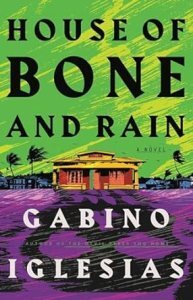
On Friday afternoon Gabino will teach a master class that draws on his experience writing horror: Killing Puppies: The Art of Violence in Fiction. He’s a thoughtful guy, and this session promises to be terrific.
Crime Bake also features other accomplished crime writers teaching master classes, including MCW’s own Kate Flora and Jule Selbo, meetings with agents and editors, panel discussions, roundtables (I’m facilitating one on writers’ superstitions), an awards banquet and plenty of time to schmooze in the bar.
A new offering this year is the opportunity to have a professional photographer update your head shot, in case yours (like mine) is a bit out of date.
The conference takes place at the Hilton hotel in Dedham, Massachusetts, just south of Boston. The website is here: https://www.crimebake.org/event/19fc0b86-ef98-4813-abc5-8fe12c599e94/summary where you can find the full schedule, a link to register and all of the other information you need.
For those who haven’t attended Crime Bake before, it has a well-earned reputation as a welcoming conference. By the end of the weekend, first-timers often find themselves with a passel of new friends.
I’ll leave you with a couple of my favorite photos of autumns past and urge you to travel around Maine this month, absorbing the beauty that surrounds us.
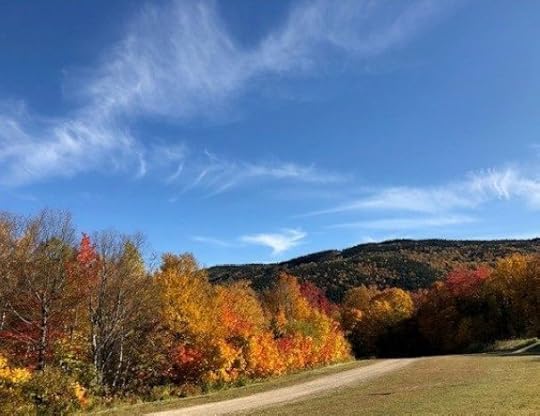
In Western Maine, there’s a gorgeous visa around every bend in the road.
Pro tip: Go online and read all the stories about the best leaf-peeping spots. Then go elsewhere. The trees show off in all of Maine’s sixteen counties.
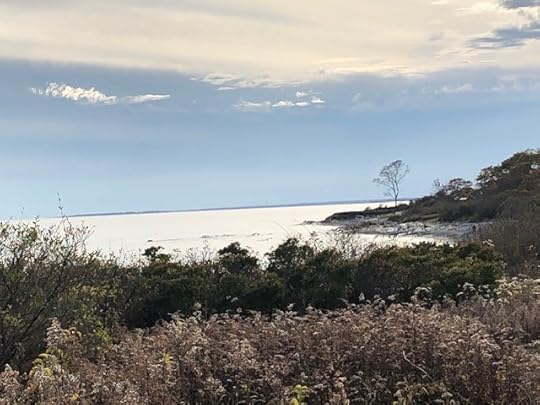
The coast is awfully pretty, too.
Brenda Buchanan brings years of experience as a journalist and a lawyer to her crime fiction. She has published three books featuring Joe Gale, a newspaper reporter who covers the crime and courts beat. She’s now hard at work on new projects. FMI, go to http://brendabuchananwrites.com
Writing too Dull? Pry those Chapters Apart and Insert . . .
Kate Flora: I am having one of those restless days. You know the ones. Scarred, the 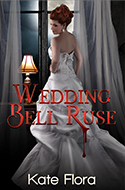 manuscript that needed the editor’s comments reviewed has been reviewed and revised. The book that the publisher is reverting back to me, Wedding Bell Ruse, has been reviewed and I’m readying the steps to republish it. The next Joe Burgess, Deliver Us from Evil, has gone through a first edit and is ready for review by beta readers. My back is killing me, a random thing that strikes from time to time, usually when I have some heavy lifting I need to do and cannot.
manuscript that needed the editor’s comments reviewed has been reviewed and revised. The book that the publisher is reverting back to me, Wedding Bell Ruse, has been reviewed and I’m readying the steps to republish it. The next Joe Burgess, Deliver Us from Evil, has gone through a first edit and is ready for review by beta readers. My back is killing me, a random thing that strikes from time to time, usually when I have some heavy lifting I need to do and cannot.
And so, looking for ideas for today’s blog post, I’ve been digging around in my old teaching files, looking for something useful to share. I have drawers full of files that go back years and years. The process makes me feel old. What did I teach back in 1999? In 2007? In 2011? Hear the big sigh?
 One thing I have learned from writing about thirty books and publishing for thirty years is that often I tend to rush my stories. I’m worst at the end, of course, when I’m eager to be done and to move on to the next story that’s trying to occupy my mind. Often, too, though, when I reread I find that I’ve left out essential scenes that are necessary for the plot, and I have to pry my chapters apart and insert a new one with the necessary information.
One thing I have learned from writing about thirty books and publishing for thirty years is that often I tend to rush my stories. I’m worst at the end, of course, when I’m eager to be done and to move on to the next story that’s trying to occupy my mind. Often, too, though, when I reread I find that I’ve left out essential scenes that are necessary for the plot, and I have to pry my chapters apart and insert a new one with the necessary information.
Sometimes, something different happens. Sometimes I’ll be writing along and I get absolutely stuck. Take a walk. Make a cup of tea. Go on ebay and buy some shoes. All of these things work. Even doing the laundry can sometimes bring the necessary clarity. But sometimes the thing just won’t write. It won’t stop being dull or my characters are just talking and nothing is happening. I know that if I am bored, you will be, too. That’s when I turn to some advice I heard in a workshop by Elizabeth Lyon to Sisters in Crime years ago.
Her very useful book is called Manuscript Makeover: Revision Techniques No Fiction Writer Can Afford to Ignore.One of the things she taught us in her workshop was about something she called “Riff Writing.” She offers this description:
We’ve all seen and heard a riff, in person or on TV. Whenever a musician, often playing jazz or rock, departs from the practiced notes of the band or sheet music and takes off on a spontaneous solo, he or she is playing a riff. Applied to our art, I call this “riff writing.”
It is similar to what has been called free writing or writing to a prompt—a picture or word or memory—or free association on paper. These methods fill your pages with writing, they help loosen you up and stick it to the censors, and they generate ideas for manuscripts. Riff-writing differs from these methods by being expressly applied to revision a portion of your writing. In this way, it’s not free writing; it’s very directed. You already have your art, your novel or short story. Riff-writing helps you expand your imagination around a particular problem or need—to lengthen a section, to add images, or to develop more characterization. You can then take the riffs and fold them into your story.
Here are the steps:
Select a sentence or paragraph in your story that seems tight, brief, or could use more behind it.
Choose a jumping-off place, such as a character’s feeling, an object, a memory, an attitude, the setting, or any other element of craft or part of speech that arrests your attention and needs revising.
Start you riff-writing, opening up at that jumping off point and developing it. Follow it like a winding creek and allow yourself to express whatever great, good, nonsensical, lewd, or dumb phrases come to mind. You have no limits or boundaries. Over-write. Don’t stop when you have the first impulse to. Keep writing; keep writing.Later, when you edit and revise, after the riff-writing has had a chance to “cool off,” you’ll have more distance from which to delete what doesn’t fit for your story, and you may have even more ideas for refining the old material.This advice works for already written material. I would also say that, with NANOWRIMO coming up in November, everything that you’ll be doing can profit from this advice. Turn off those critical editing heads that perch on your shoulder and keep saying no. Just say yes and see where the writing takes you.
And on a completely different note: Are you signed up for the New England Crime Bake, our region’s own mystery conference that takes place in Dedham, MA on Nov.10-12? If you’re a writer, a mystery fan, or someone who dreams of writing your mystery novel, you should be there. More at crimebake.org
September 30, 2024
The Girls in the Boat
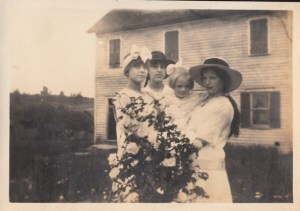
Harriet Wakeman, Harriet’s sister, Marie Coburg, Merle Coburg
Kaitlyn Dunnett/Kathy Lynn Emerson here. I’ve posted before about estate planning for authors here. Part of that plan, for me, anyway, included putting a couple of bequests in my will to protect material I’ve been hoarding for years. After I’m gone, my “author’s papers” and some other writing-related material will go to the Maine Women Writers Collection at the University of New England, which is housed in Portland. All the local history and genealogy material I’ve accumulated on my family, including a goodly number of old photographs, will go to the Sullivan County Historical Society in New York State—the area where I lived until I moved to Maine to attend college in 1965 and where both my paternal and maternal ancestors had settled by the 1800s.
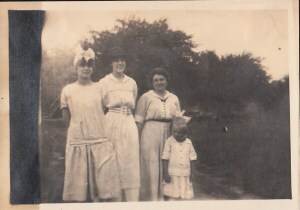
Harriet Wakeman, Harriet’s sister, Katie Hornbeck, Marie Coburg
I’ve also blogged before about solving genealogical mysteries, most recently here and here and, wouldn’t you know it, I found another one.
Back in 1987, on her last trip north from her home in Florida, my mother, Marie Coburg Gorton, went through her family’s photo album to identify the people she recognized. I wrote down what she said next to each picture, but there were still a lot of question marks. And, as I discovered when I recently started sorting and labeling everything, there were a couple of identifications she got wrong.
Scattered through the album, although some seem to have been taken on the same day, are a number of photos of what I’m calling “the girls in the boat.” They show a rowboat on the farm pond (a pond dug to provide recreational opportunities for guests at the summer boardinghouse my ancestors ran at their farm in Hurleyville, NY during the last part of the 19th century and the first half of the 20th). Even enlarged, it’s hard to see faces, but there were definite similarities, particularly in the hats these girls wore.
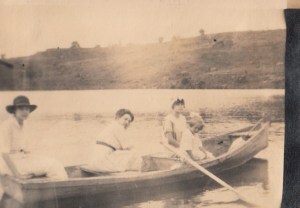
Harriet’s sister, Katie Hornbeck, Harriet Wakeman, Marie Coburg
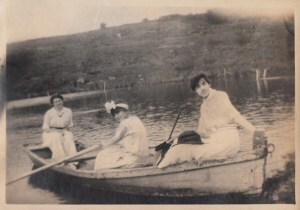
Katie Hornbeck, Harriet Wakeman, Harriet’s sister
Fortunately, there were two non-boat pictures in which Mom was certain of the subjects’ identities. They are shown at the top of this post. One is of “the Wakeman girls” and Mom as a child, held by her aunt, Merle Coburg. As Merle was only ten years older than my mother, I initially guessed the photo was taken c. 1915, when Mom was about five. I’ve since reconsidered and think the date must have been closer to 1918, when she was eight. As an adult, she was only 5’3″ tall, so she would probably have been on the small side as a child. In the other photo, she identified Harriet Wakeman, Harriet’s sister, her aunt, Katie Hornbeck, and herself. Since the hats are the same, I cleverly deduced that these photos were all taken on the same day.
A little research using Ancestry.com and Find A Grave, plus the fact that Mom elsewhere gave one of the Wakeman girls a first name—Harriet—led me to more information. Harriet Wakeman was born on April 6, 1899, so she was a year older than Aunt Merle. She had two sisters, Lucy, (b. November 9, 1894), and Hazel (b. October 4, 1900). It is most likely Hazel who is shown with her in the photos. There was some brief confusion because what I had written next to one photo said “Harriet and Cole Wakeman.” In point of fact, on November 16, 1919, Harriet Wakeman married Palmer H. Cole, so her photos in the boat were most likely taken before that date. Yay! Mystery solved. People have been identified. Right? Not quite.
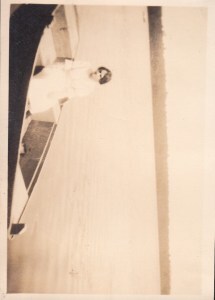
Louella Hornbeck
There were more “girls in the boat” photos in the album. Mom identified one woman sitting by herself as her aunt, Louella Hornbeck. I have other photos of Aunt Lou and this one didn’t look a lot like them, but there were two other photos of unidentified people that included a woman who looked like the one in the boat. Could one be Aunt Lou and her future husband, Anson Bates? They were married on October 1, 1921. They’re with one person I always recognize, my grandmother, Katie Hornbeck Coburg, who also appears in boat photos and in one with the Wakeman sisters and my mother, but there’s another woman in that picture, too—one who looks a little like Harriet Wakeman’s sister. But maybe not.
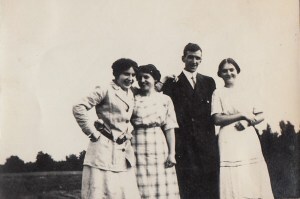
Then there’s the photo showing Lou and Katie’s parents and Katie and another young woman on the porch of the farm. Is that Lou, too? It’s definitely her in the photo with Katie, their older sister, Ida Hornbeck Crosby, Ida’s children, and my mother.
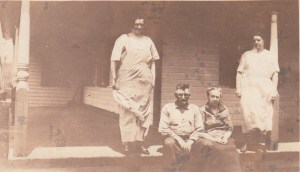
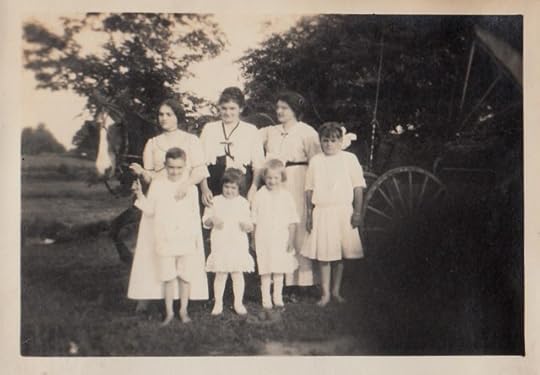
Lou Hornbeck, Ida Hornbeck Crosby, Katie Hornbeck; Walter Crosby, Martha Crosby, Marie Coburg, Eleanor Crosby
Then I wondered if the relative heights were a problem. Here’s a formal shot of the Hornbeck sisters.
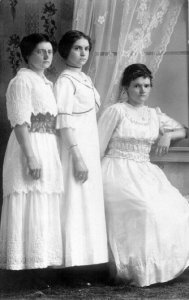
Katie, Lou, and Ida Hornbeck
Yes, this was getting confusing, and that’s without adding in the fact that my mother’s mother, Tressa Hornbeck Coburg, sister to Ida, Katie, and Lou, died when Mom was born. My mother was raised by her grandparents, M.G. and Ella Hornbeck, and her Aunt Katie. Katie Hornbeck later married her sister Tressa’s widower (Mom’s father) but not until after her mother died, because Ella blamed Tressa’s husband for Tressa’s death. The fact that it had been a shotgun wedding probably didn’t help! I always knew my mom’s “Aunt Katie” as “Grandma Coburg.”
This whole process of labeling photos looks like it will take much longer than I expected, with lots of rabbit-hole research along the way, but if I don’t make the attempt to identify people, there probably isn’t anyone else left who can. That makes it a responsibility as well as a challenge. Meanwhile, if you enjoy looking at old photos, here are some more photos showing girls in the boat.
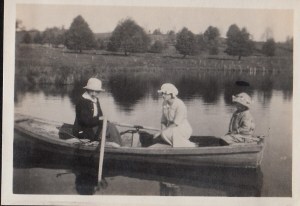
Grace Monroe, Lou Hornbeck, Marie Coburg
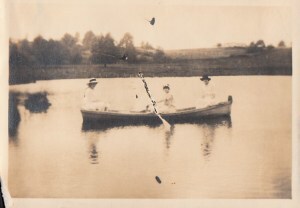
Merle Coburg, Harriet Wakeman, Harriet’s sister
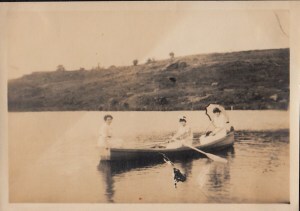
Katie Hornbeck, Harriet Wakeman, Harriet’s sister
Kathy Lynn Emerson/Kaitlyn Dunnett has had sixty-four books traditionally published and has self published others. She won the Agatha Award and was an Anthony and Macavity finalist for best mystery nonfiction of 2008 for How to Write Killer Historical Mysteries and was an Agatha Award finalist in 2015 in the best mystery short story category. In 2023 she won the Lea Wait Award for “excellence and achievement” from the Maine Writers and Publishers Alliance. She was the Malice Domestic Guest of Honor in 2014. She is currently working on creating new omnibus e-book editions of her backlist titles. Her website is www.KathyLynnEmerson.com.
What’s the Hardest Thing About Writing?
From time to time, we chime is as a group on writing-related subjects. Today’s question is what, for each of us, is the hardest thing about writing? And dear readers, we’d love your answers to this question, too.
Kate Flora: I probably have a different answer for this question depending on where I am in the process. I’m going to skip finding an agent, finding a publisher, and all the painful things that come after the work is finished. So for me, my usual problem is that I tend to rush my endings. By the time I finally get to the end of the book, I want it to be done. This is first draft, of course, so no way is the book done. But I was the story tied up. I want to see how it ends. And so I rush. There has never been a book where I didn’t have to go back in rewrite, slow the pace down a bit so things are well described and explained, and also do a read through to make sure that I’ve tied up all, or at least most, of the loose ends so the reader doesn’t say, with a sigh, “But what about the dog?” or something similar. The lesson for me is to keep better notes as I go along and not put things in the book that I don’t intend to finish.
What about you, fellow…what are your biggest challenges?
Matt Cost: As most of life can tilt and vary, so can my writing process. Sometimes the beginning of a new book is the toughest because I have to make sure that the base is stable. If I’m beginning a new series, say with Wolfe Trap, I have to create an entire fictional town. Or with Velma Gone Awry, I had to place myself firmly in 1920s Brooklyn, New York. But more often than not, it is the middle of a novel that becomes a bit tedious for me, and that scares me, because if it is tedious for me, imagine the boredom being inflicted upon a reader. So, I must work hard to keep the plot buzzing along like a chainsaw in the woods, and cut out all that makes eyes glaze over when reading. One thing that is rarely difficult for me is the end of the book. By the time I get to the last ten-thousand words, I generally have an image in my head what is going to happen and the only problem is slow fingers on a keyboard. And then we begin again.
Kaitlyn Dunnett/Kathy Lynn Emerson: These days the only “new” writing I’m doing consists of blogs for MCW, but I am busily revising and editing backlist titles to reissue in e-book and print-on-demand formats. What’s hardest for me about that is stopping. It’s possible to do endless revisions, each time finding more to tweak. Unfortunately, if I yielded to that temptation, nothing would ever be published. I have to force myself to decide I’ve reached the point of “one last read” to try to catch any remaining typos (I swear they sneak in every time I make a change in the text!) and stick with that decision. At least with e-books and POD it’s possible to go back later and correct any I missed.
Rob Kelley: For me it’s that late second draft when I realize that what I have is tens of thousands of words and a lot of cool ideas but not a compelling story–uneven pacing, weak characters, too many characters, too few interesting locales, dumb or missing plot twists–it varies by book. Right now I’ve got two manuscripts in that same state and the only thing I’ve found that propels the project forward again is time. And this is not a predictable amount of time. More than a couple of weeks. At least one instance where it was more than a year. I’d love to figure out how to make that a more consistent process! Sometimes I can wait it out, sometimes I start a whole new book to give me something to chew while the rumination on those other books happens as well.
John Clark: Feedback from others that hits a nerve. I tend to add too much to stories, and often use older phrases. While I don’t always think they’re outdated, others do, so I gnash my teeth, crawl back in my cave, ponder for a bit and sometimes admit they’re right.
September 27, 2024
Weekend Update: September 28-29, 2024
 Next week at Maine Crime Writers there will be a group post on Monday and posts by Kaitlyn Dunnett/Kathy Lynn Emerson (Tuesday), Kate Flora (Thursday), and Brenda Buchanan (Friday).
Next week at Maine Crime Writers there will be a group post on Monday and posts by Kaitlyn Dunnett/Kathy Lynn Emerson (Tuesday), Kate Flora (Thursday), and Brenda Buchanan (Friday).
In the news department, here’s what’s happening with some of us who blog regularly at Maine Crime Writers:
An invitation to readers of this blog: Do you have news relating to Maine, Crime, or Writing? We’d love to hear from you. Just comment below to share.
And a reminder: If your library, school, or organization is looking for a speaker, we are often available to talk about the writing process, research, where we get our ideas, and other mysteries of the business, along with the very popular “Making a Mystery” with audience participation, and “Casting Call: How We Staff Our Mysteries.” We also do programs on Zoom. Contact Kate Flora
Wintery Prose
Charlene D’Avanzo: As the days grow cooler and shorten we Mainers all know what’s coming. Despair not! Instead, here are a few books that will help us celebrate inevitable wintery worlds:
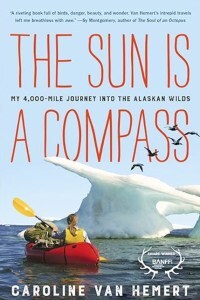 The Sun is a Compass: A 4,000-Mile Journey into the Alaskan Wilds by Caroline Van Hemert: A biologist’s gripping tale of a human-powered journey from the Pacific Northwest to the Arctic to rediscover her love of birds, nature, and adventure.
The Sun is a Compass: A 4,000-Mile Journey into the Alaskan Wilds by Caroline Van Hemert: A biologist’s gripping tale of a human-powered journey from the Pacific Northwest to the Arctic to rediscover her love of birds, nature, and adventure.
Guided by birds, an ornithologist and her husband follow the trails of animals on a 4,000-mile rowboat, ski, foot, raft, and canoe journey from the Pacific rainforest to the Alaskan Arctic.
This Much Country by Kristin Knight Pace: A memoir of heartbreak, thousand-mile races, 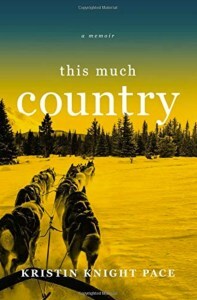 the endless Alaskan wilderness and many, many dogs from one of only a handful of women to have completed both the Yukon Quest and the Iditarod.
the endless Alaskan wilderness and many, many dogs from one of only a handful of women to have completed both the Yukon Quest and the Iditarod.
In 2009, after a crippling divorce that left her heartbroken and directionless, Kristin decided to accept an offer to live at a friend’s cabin outside of Denali National Park in Alaska for a few months. In exchange for housing, she would take care of her friend’s eight sled dogs.
That winter, she learned that she was tougher than she ever knew.
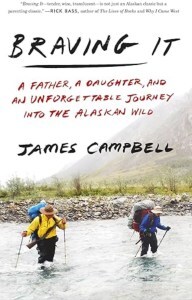 Braving It: A Father, a Daughter, and an Unforgettable Journey into the Alaska Wild: A powerful story of a father’s journey with his teenage daughter to the far reaches of Alaska.
Braving It: A Father, a Daughter, and an Unforgettable Journey into the Alaska Wild: A powerful story of a father’s journey with his teenage daughter to the far reaches of Alaska.
Home to only a handful of people, Alaska’s Arctic National Wildlife Refuge is a harsh and lonely place. That’s why James Campbell hesitated to invite his fifteen-year-old daughter, Aidan, to join him. Would she be able to withstand clouds of mosquitoes, the threat of grizzlies, bathing in an ice-cold river, and hours of grueling labor peeling and hauling logs?
But once there, Aidan embraced the wild. Despite windchills of 50 degrees below zero, father and daughter ventured out daily to track, hunt, and trap. Under the supervision of Edna, Heimo’s Yupik Eskimo wife, Aidan grew more confident in the woods.
September 26, 2024
Why Do I Breathe?
Why do I read?
I write to transpose myself to another reality, I suppose, placing myself squarely in the shoes of another somewhere else. Reading for me is the means to see through the lens of other people in different places scattered throughout history. It is a combination of empathy, the desire to understand others, and narcissism, the drive to understand human behavior for my own gain.
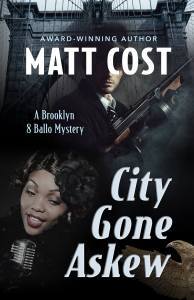
Why do I write?
Where reading takes me to another world, writing allows me to build that world. That other place starts out as just a speck, or a shadow lurking in the darkness, something that needs to be hewn and carved and polished to be made into something beautiful or noteworthy.
Don DeLillo was quoted as saying, “The scene comes first, an idea of a character in a place. It’s visual, it’s Technicolor—something I see in a vague way. Then sentence by sentence into the breach.”

For me, the idea, the concept, of a novel is like a hallucination simmering on the horizon, a vision that must be molded for others to see, much like Michelangelo’s David or Bugsy Siegel’s casino, the Flamingo. Bugsy saw a glimmer in the desert, a vague notion of something grand, a vision that few others were capable of seeing, even when shown. Out of this glimmer was born Las Vegas.
Ideas like shadows flit through my mind and I want to carve them into the recognizable potential that I know that they are. It is my attempt to understand the world around me.
It would be nice to have my books win accolades, awards, praise, and be bestsellers, but it is not necessary.
Elmore Leonard was always one of my favorite writers, both in westerns and crime novels. I believe this quote of his hits the nail on the head. “In 1984, I finally got on the ‘New York Times’ bestseller list, after I’d been writing for 30 years. It was never one of my goals because I didn’t care for any of the books on that list. The ones that made that list, I wouldn’t read. The review was written by that guy from Maine, who is at all the Red Sox games. What’s his name? Stephen King. He’s terrific. He wrote something like, “After I read this book, I had to go back and read the last seven or eight books.” That’s when I knew I was doing fine.”
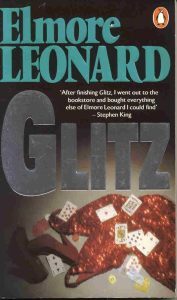
Why do I walk the dogs in the woods?
Everyday I take multiple walks in the woods with my dogs. We all need the exercise, of course, but there is a simplicity and beauty to the experience that is unique to every single one of these walks that makes it worthwhile. That is how I feel about the books that I read and write.
The desire to take the shadowy images on the periphery of my conscious mind and carve them into something unique and beautiful drives me to write. But it is not why I write. It is something more essential and vital than just that. The reason I write can best be summed up with a question.
Why do I breathe?
September 23, 2024
End of the Line
Shameless Commerce Division:
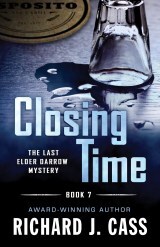 Closing Time, the last Elder Darrow mystery, will publish on October 2. Please join me for the official launch at Longfellow Books in Portland at 6 PM on that evening. You can preorder copies of Closing Time from Kelly’s Books To Go if you’d like them signed or inscribed and you can’t make the launch. Thank you for your support.
Closing Time, the last Elder Darrow mystery, will publish on October 2. Please join me for the official launch at Longfellow Books in Portland at 6 PM on that evening. You can preorder copies of Closing Time from Kelly’s Books To Go if you’d like them signed or inscribed and you can’t make the launch. Thank you for your support.
* * *
I’ve been thinking about how two different crime writers whose work I respect have ended long-running and successful series this year and wondering if my decision to close off the Elder Darrow series means there is something in the air about endings. Thinking about what their decisions might have been like made me inspect my own motives.
Elder Darrow is a character close to my heart. We share a city, an employment history, and a belief that humans are basically OK, tempered with a cynical resignation that most of the time, Sturgeon’s Law applies. But I started to wonder if I’d said everything about him I needed to say, or could say. I decided I would rather shelve Elder too soon than trot him out again if there was a possibility I had exhausted his potential.
Not that anything writers do is easy, but I also wanted to make sure I wasn’t tempted to an easier path, where I didn’t have to invent new characters or locations. There’s a temptation to continue to do what you’ve done, presumably as well as you could, and you can get too comfortable repeating your self.
Having so much of the action take place in the bar also started to feel too close, as if the fictional geography were hemming me in. I think I have more to say about Boston and started to feel like I needed to expand the fictional field, maybe put a new character in a new situation that would let him or her see more of the city.
I also have a horror of repeating myself, which is always a danger in a series. For example, in Closing Time, I realize I was listening to Grant Green  quite a bit, and telling the reader that at every opportunity. Slippery slopes.
quite a bit, and telling the reader that at every opportunity. Slippery slopes.
Solo Act, the first published Elder Darrow (though the second in the series) was my first published novel. I have the idea that, the early books in particular, were apprentice work, that the character and location fatigue I’ve been feeling is a result of decisions I made about the series when I knew less about what I was doing. I can’t articulate them clearly, but they’re there and they feel like limits.
I do believe that series need to end eventually. I’ve seen too many writers (and estates of writers) continue series characters long past the point of interest or development. I’d rather have quit a series too soon than too late. One of my deep peeves with a series is when the protagonist and/or other principal characters become predictable. The plots usually suffer.
I have thought about spinning off a character as a way of keeping a series alive. James Lee Burke just spun off the Clete Purcel character from the Dave Robicheaux novels into 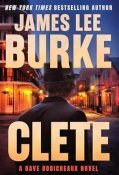 an eponymous book and very successfully. Assuming I haven’t already killed off all the interesting characters in Elder’s world, I might consider that.
an eponymous book and very successfully. Assuming I haven’t already killed off all the interesting characters in Elder’s world, I might consider that.
I did wind up making certain decisions this time, knowing this was the end. Though I’ve always said you can read the first six in the series in any order, you will need to have read at least one other Elder Darrow to get the full flavor of Closing Time. The emotions of the last book won’t make sense without understanding some of the preceding relationships, especially since I killed off a major character. And I decided to create some romantic hope for Elder, who has had bad luck and trouble on that score right along.
Of course, you never really close the door on a series unless you kill off your protagonist. And maybe not even then—vide Sherlock’s fate after dying in the Final Problem. So I didn’t kill Elder off, though (no spoiler), things have changed fundamentally. I hope you have a chance to find out how.
Happy New Year
There’s something special about September. As a child, I thought it signified the new year. School began the Tuesday after Labor Day. My friends and I marked the years by the school grade. January 1st was remarkable only for the parades. Once Christmas vacation ended, we returned to the same grade/year unscathed by resolutions made or broken.
September arrived with the smell of school supplies, new bookbags (we didn’t have backpacks), pink erasers, and fresh pencil shavings. I continue the tradition today. Not the bookbags, but my Amazon account attests to my need to replenish office staples and calendars in the fall.

9/21/2007
September also brought a change of season. Brilliant reds, yellows, and oranges stained the leaves of trees that had been deep green through the sticky days of summer. The air filled with the winey scent of apples ripening. I grew up in northeastern New Jersey. My mother’s family lived in upstate New York. Each year we’d take the long drive through the back roads from Rutherford to Utica to celebrate my great-grandfather’s birthday. We’d stop at the first apple stand we saw, bought a bushel for a dollar, and munched our way through the woods. The further north we traveled, the more the leaf color deepened. Once past Albany, the vista was blinding.

9/26/2020
The trips stopped when my mother’s family moved. Fall came to New Jersey annually, but the drama had passed. There was something unique about being immersed in vibrant colors rather than passing single trees lining urban streets. You might say the color commentary lost its color. Until I moved to Maine. The blinding color in my backyard brought back those childhood trips and my great-grandfather’s folklore stories.

10/5/2021
Despite a distance of almost six hundred miles, northern Maine folklore matches that of upstate New York. Now that I’m setting books in Maine, I’ve made note of the stories. Here’s a few for your consideration:
A large crop of berries on the mountain ash trees means a long, cold, hard winter. That’s concerning because this year is a bumper crop

9/25/2022
If woolly worms have a small red band, winter will be hard. Last year’s woolly worms had slim bands, and the winter was mild. The winter of 2020/21 was ice-filled. That autumn the crop of woolly worms had slim bands near their tails. This year, most I’ve seen have big wide bands. The result remains to be seen.
If hornets’ nests are high, the snow will be deep. Last year’s hornets’ nests were right under the roofline of the house and garage. This year we don’t have any—and I’m not complaining. I don’t care how accurately they predict weather. I’m allergic.

9/28/2023
One I haven’t been able to find is apple folklore. Last year, every apple tree anyone had ever planted on this property bloomed and produced yummy apples. The bloom was so prolific that we discovered a small old apple grove that we’d never seen produce before. This year very few of those trees bloomed, and those that did produced very few apples. We’ve been told it could be because of last year’s mild winter and spring that the fruit didn’t set. I’ll be curious if anyone has any insight.

9/10/2024
Whatever happens this winter, we’ll know soon enough. While we wait, I’ll wish you a happy fall New Year. The photos accompanying this blog were taken in my backyard on various dates in the last week of September.
Kait Carson writes the Hayden Kent Mysteries set in the Fabulous Florida Keys and is at work on a new mystery set in her adopted state of Maine. Her short fiction has been nationally published in True Romance, True Confessions, True Story, True Experience, Woman’s World magazines, and in the Falchion Finalist Seventh Guppy Anthology Hook, Line, and Sinker. She is a former President of the Guppy Chapter of Sisters in Crime and a member of Sisters in Crime, Guppies, and Sisters in Crime New England. Visit her website at www.kaitcarson.com. While you’re there, sign up for her newsletter.
Lea Wait's Blog
- Lea Wait's profile
- 509 followers



